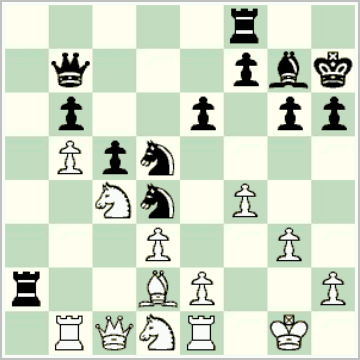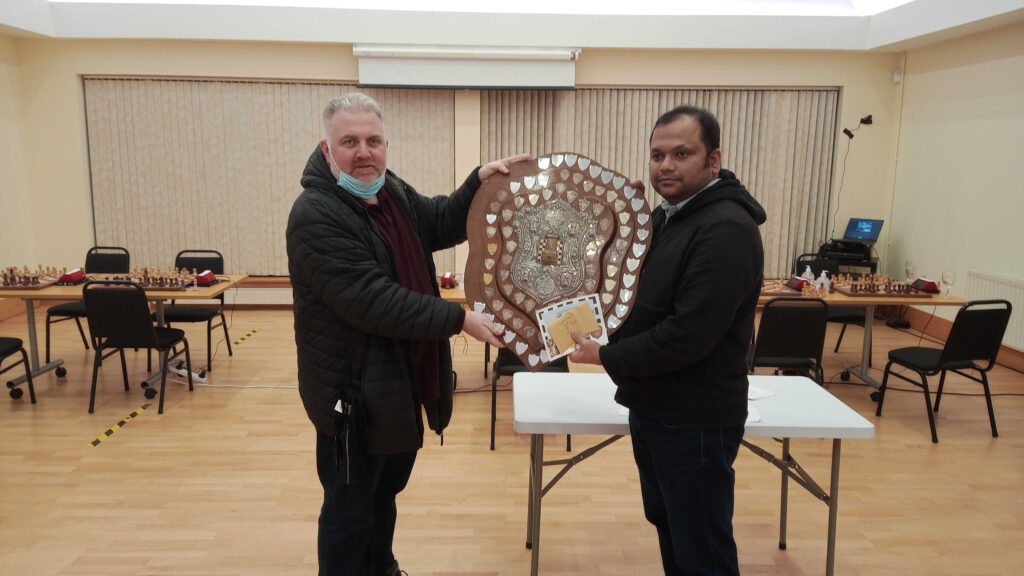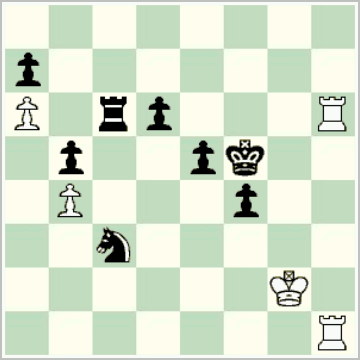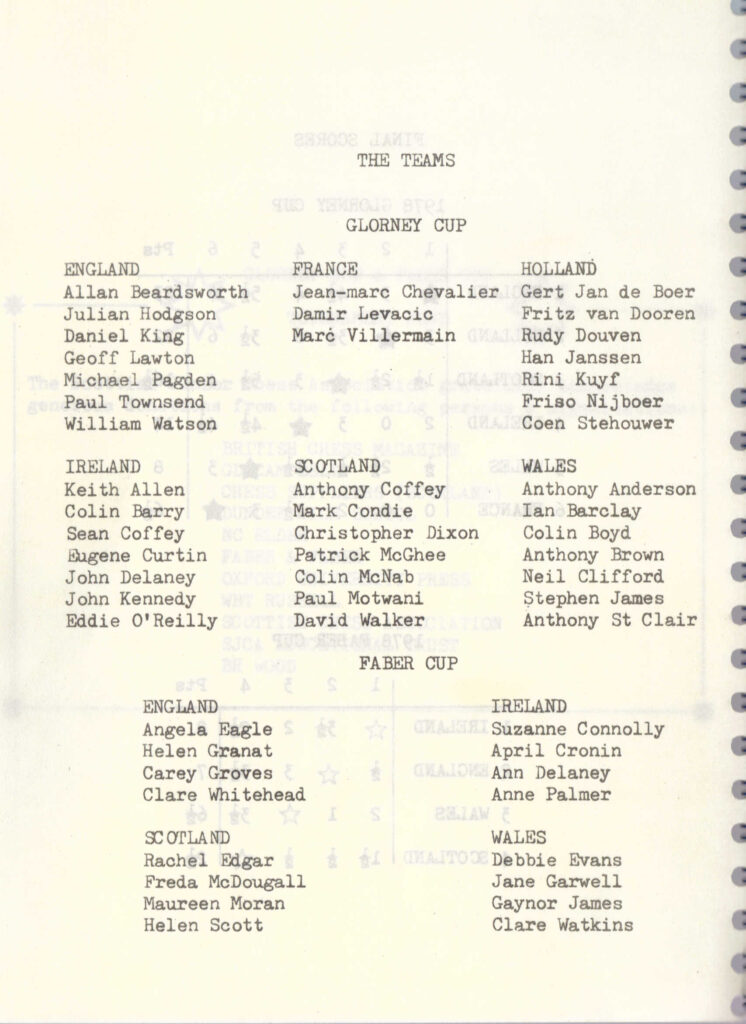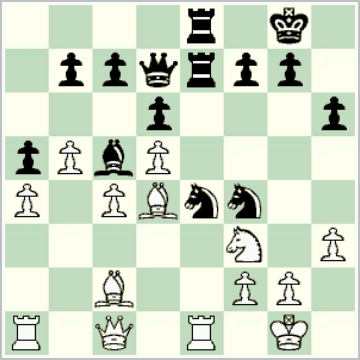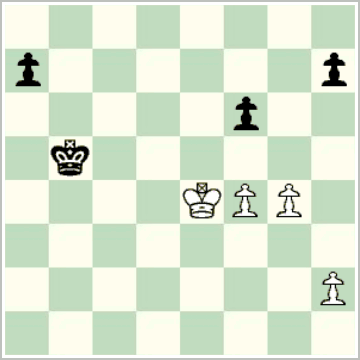The Glorney Cup 1957 took place at MacBrayne Hall, Glasgow, on July 24-25, 1957. Once again four teams competed. Earlier in the year, the British Chess Federation made a controversial decision to withdraw England from participation, starting in 1958, on the grounds that the event provided insufficiently strong opposition for the English players.
On the opening morning, England beat Ireland 5 – 1, and Scotland beat Wales 4 – 2.
| Ireland |
|
England |
| J. McMahon |
0 – 1 |
M. Macdonald-Ross |
| T. M. Alcorn |
0 – 1 |
C. G. Burton |
| A. Coldrick |
1 – 0 |
A. P. Nicholas |
| P. Deasy |
0 – 1 |
B. H. Hare |
| H. Harte |
0 – 1 |
R. Fletcher |
| S. Gilroy |
0 – 1 |
J. A. Lawrence |
|
1 – 5 |
|
| Scotland |
|
Wales |
| M. Fallone |
1 – 0 |
P. M. Perry |
| G. Dickson |
1 – 0 |
F. S. Wusteman |
| J. O’Sullivan |
½ – ½ |
J. R. Holland |
| J. T. Hennigan |
1 – 0 |
C. M. Bloodworth |
| C. Malcolm |
0 – 1 |
R. C. Denning |
| G. Bonner |
½ – ½ |
A. Reddaway |
|
4 – 2 |
|
In the evening, Scotland drew with England, and Ireland beat Wales.
| Scotland |
|
England |
| M. Fallone |
½ – ½ |
M. Macdonald-Ross |
| G. Dickson |
1 – 0 |
C. G. Burton |
| J. O’Sullivan |
0 – 1 |
A. P. Nicholas |
| J. T. Hennigan |
1 – 0 |
B. H. Hare |
| C. Malcolm |
0 – 1 |
R. Fletcher |
| G. Bonner |
½ – ½ |
D. E. Rumens |
|
3 – 3 |
|
| Wales |
|
Ireland |
| P. M. Perry |
0 – 1 |
J. McMahon |
| F. S. Wusteman |
0 – 1 |
T. M. Alcorn |
| J. R. Holland |
½ – ½ |
A. Coldrick |
| R. G. Denning |
1 – 0 |
P. Deasy |
| M. Mears |
0 – 1 |
H. Harte |
| C. M. Bloodworth |
0 – 1 |
S. Gilroy |
|
2 – 4 |
|
On the second day, England beat Wales, and Scotland narrowly edged Ireland.
| England |
|
Wales |
| M. Macdonald-Ross |
1 – 0 |
P. M. Perry |
| C. G. Burton |
1 – 0 |
F. S. Wusteman |
| A. P. Nicholas |
1 – 0 |
J. R. Holland |
| R. Fletcher |
½ – ½ |
R. G. Denning |
| B. H. Hare |
½ – ½ |
A. Reddaway |
| J. A. Lawrence |
½ – ½ |
M. Mears |
|
4½ – 1½ |
|
| Scotland |
|
Ireland |
| M. Fallone |
1 – 0 |
J. McMahon |
| G. Dickson |
1 – 0 |
T. M. Alcorn |
| J. T. Hennigan |
0 – 1 |
A. Coldrick |
| J. O’Sullivan |
1 – 0 |
P. Deasy |
| J. E. R. Campbell |
0 – 1 |
H. Harte |
| G. Bonner |
½ – ½ |
C. N. Glass |
|
3½ – 2½ |
|
The first named team had White on odd boards in all matches.
So on match points, England and Scotland tied for first, with Ireland third and Wales fourth. BCM quoted Ritson Morry in detail: “Under the rules adopted for the Glorney Cup four years ago in Glasgow, England should have been declared winners on game average, but for some unexplained reason the Glorney Cup Committee decided that the Trophy should be held jointly by the two countries.” This was the first time in the history of the Glorney Cup that England had not won the event outright.
Four games are available from the event, and all involved Irish players: Art Coldrick’s win and Seán Gilroy’s loss against England, and the losses by John McMahon and Tom Alcorn against Scotland (see scorecards). It’s interesting to note that Gilroy and McMahon each had winning positions in complicated games. (None of these games currently appear in the ICU games archive.)
The leading scorers were George Dickson (Scotland), 3/3, Art Coldrick (Ireland), Michael Macdonald-Ross and Roger Fletcher (England), and Ronald G. Denning (Wales), all on 2½/3.
|
eng |
sco |
irl |
wls |
mp |
gp |
| England |
. |
3 |
5 |
4½ |
5 |
12½ |
| Scotland |
3 |
. |
3½ |
4 |
5 |
10½ |
| Ireland |
1 |
2½ |
. |
4 |
2 |
7½ |
| Wales |
1½ |
2 |
2 |
. |
0 |
5½ |
John McMahon’s recollections of the 1957 event, in The Glorney Cup: Early Years 1948-1963 were that “without Grogan, Deiseach and Kennedy from 1956 the young Irish team struggled a bit”, but as well described there, better days lay ahead.
The Irish team was John McMahon (O’Connell’s School, Dublin & Kevin Barry C.C.), 1940-2021, Leinster and Irish Schoolboys’ champion 1957, Tom M. Alcorn, 1940-2003 (Royal Belfast Academical Institution & C.I.Y.M.S. C.C.), Ulster Schoolboys’ champion 1956, Art Coldrick (O’Connell’s School, Dublin & Phibsboro C.C.), b. 1941, Olympiad team member in 1972, Pat Deasy (Synge Street C.B.S., Dublin & Eoghan Ruadh C.C.), Harry Harte, b. 1940 (Belfast High School), Ulster Schoolboys’ champion 1957, Seán Gilroy (Synge Street C.B.S., Dublin & Eoghan Ruadh C.C.), and (Cyril) Neil Glass, b. 1939 (Campbell College, Belfast). Of these, the last four, Deasy, Harte, Gilroy, and Glass, made their débuts. The Irish Schoolboy’s championship 1957 had ended in a three-way tie, with Coldrick finishing second on tie-break and Deasy third.
The English team was Michael Macdonald-Ross, b. London, 1939, British Boys’ joint champion 1956, later author of Nimzo-Indian Defence: Leningrad System (Batsford, 1978), Colin G. Burton (Central Grammar School, Birmingham), Andrew P. Nicholas (Birmingham), Brian Henry Hare (Stroud), 1940-2018, Roger Fletcher (Huddersfield), 1939-2016, John A. Lawrence (Birmingham), British Boys’ under-fifteen joint champion 1957, and David Edward Rumens (Harrow Weald), 1939-2017, British Boys’ champion 1957 (shortly after the Glorney Cup), who later finished joint second (third on tie-break) in the World Junior Championship in 1959, and became an FM (circa 1980). All players made their début.
The Scottish team was Michael Fallone (Our Lady’s, Hamilton), b. Bellshill, Lanarkshire, 1938, later Scottish champion (1963), Olympiad team member in 1956, 1964, and 1966 (biographical sketch), who was playing in the last of his six Glorney Cups, George Dickson (Edinburgh), 1938-2017, Scottish Boys’ champion 1955, who was also playing in his last Glorney Cup, and who recorded a perfect 8/8 over the course of his career, (obit., biographical sketch, photo, 2015), J. O’Sullivan, John T. Hennigan, Colin Malcolm, Gerald Bonner, b. Glasgow, 1941, Scottish Boys’ champion 1957, later Scottish champion in 1967, 1970, and 1972, and Olympiad team member in 1964, 1970-76, and 1980 (biographical sketch), and J. E. R. Campbell. Of these, the last three, Malcolm, Bonner, and Campbell, made their début. John T. Hennigan is the father of IM Michael Hennigan, British champion in 1993.
The Welsh team was P. M. Perry (St. Illtyd’s College, Cardiff), Frederick Stephen Wusteman (Old Illtydians), J. R. Holland (Ebbw Vale Grammar School, Cwm), joint Welsh Schoolboys’ champion 1957, Colin M. Bloodworth (Pontypridd Grammar School), joint Welsh Schoolboys’ champion 1957, Ronald G. Denning (Canton High School, Cardiff), A. Reddaway, and M. J. Mears (St. Illtyd’s College, Cardiff). Of these, Holland, Bloodworth, Denning, and Reddaway made their débuts.
Many thanks to David McAlister and John Gibson for providing helpful information, some of which I was finding very hard to find.
- BCM 1957 pp. 226-27 (report, all scorecards, discussion of awarding of trophy)
- CHESS, vol. 22, nos. 297-8, pp. 298-99, August 20th, 1957 (via John Gibson) (report, all scorecards, discussion of awarding of trophy), p. 304, same date (via David McAlister) (score of Lawrence – Gilroy); vol. 23, p. 30, October 19th, 1957 (scores of Fallone – McMahon and Alcorn – Dickson)
- Belfast Telegraph, April 24, 1957 p. 12 (photo of Harte); December 6, 1957 p. 14 (Harte school affiliation)
- Irish Independent, April 24, 1957 p. 11 (Harte Ulster Schoolboys’ champion 1957; McMahon Leinster Schoolboys’ champion 1957); April 27, 1957 p. 13 (Irish Schoolboys’ championship 1957 results)
- Irish Times, February 7, 1957 p. 4 (club affiliations of Deasy and Gilroy), May 2, 1957 p. 7 (Irish Schoolboys’ championship results), July 18, 1957 p. 6 (Irish team chosen (including Tony Duffy instead of Glass)); August 8, 1957 p. 8 (report, including all match scores; score of Coldrick – Nicholas)
- Middlesex County Times, August 3, 1957 p. 3 (“Chess: Glorney Cup Contest”, A. F. Stammwitz) (report, giving game points and stating “England thus retain the trophy”)
- Sunday Independent, January 27, 1957 p. 15 (school affiliations for Coldrick, Deasy, McMahon)
- Western Mail & South Wales News, July 23, 1957 p. 9 (Welsh team, including school affiliations; archived record hard to read, and Reddaway’s school is obscured); August 21, 1957 p. 8 (Bloodworth and Holland joint Welsh Boys’ champions 1957); August 1, 1958 p. 9 (Denning first name, and photo (in play against John McMahon in 1958 Glorney Cup)
- Scottish teams in the Glorney Cup, Chess Scotland web pages (scores of Fallone – McMahon and Alcorn – Dickson; available first names for Scottish players)
- Campbell College Register 1894-1954 (via David McAlister) (Glass first names, year of birth)
- The Arthur Pinkerton Story: An autobiographical sketch, UCU web site (via David McAlister) (Glass generally known as Neil)
- Emails from David McAlister, February 2, 2022 (Alcorn’s full date of birth (from Albert Long’s notebooks); obit.; Harte’s full date of birth (same source) (only year given here))
- 43rd British Chess Championship (1956), BritBase (ed. John Saunders) (Macdonald-Ross joint British Boys’ champion 1956; Nicholas first name)
- 44th British Chess Championship (1957), BritBase (ed. John Saunders) (Rumens British Boys’ champion 1957; Hare biography; first names of Bloodworth, Burton, Fletcher, Lawrence)
- 77th Varsity Match (1959), BritBase (ed. John Saunders) (re Fletcher, including photo in 1959, reference to tribute)
- Pontrypridd Chess Club History, Welsh Chess Union web pages (Bloodworth first name, school)
- The nitrogen metabolism of Azotobacter vinelandii : with special reference to the mechanism of fixation, Frederick Stephen Wusteman, Ph.D. thesis, Imperial College London, 1962 (Wusteman full name) (note: name often given incorrectly as “Wusterman” in contemporary chess sources)
- John McMahon, Tom O’Neill, Frank McMahon, The Glorney Cup: Early Years 1948 – 1963, ca. October 2020 (report; photos of McMahon, Harte; Deasy first name)
- Gaige, Jeremy, Chess Personalia: A Biobibliography. Jefferson, North Carolina: McFarland & Co., 1987. ISBN 0-7864-2353-6 (reprint, 2005) (Macdonald-Ross full name (Michael Inman Philip Macdonald-Ross), date and place of birth; same for Bonner, Rumens)
Update, February 3, 2022: the initial report misstated Alcorn’s year of birth; David McAlister provided the correct date and link to obituary notice from 2003, and also Harry Harte’s full date of birth, plus school affiliation. Many thanks again to David.
Update, March 12, 2022: modified Coldrick’s biographical sketch to add Olympiad.
Update, October 16, 2022: changed Burton’s first name, following the BritBase page on the British Championship 1957, and added his school based on the reference below. Burton’s first name was given as “Charles” previously (cf. , BritBase (ed. John Saunders), version of March 6, 2022 (via the Wayback Machine)).
- Birmingham Daily Post, April 18, 1957 p. 37 (Burton first name, school, and photo)
Update, December 17, 2022: additional references.
- Ireland’s Saturday Night, July 20, 1957 p. 2 (Irish team); July 27, 1957 p. 3 (first round matches, with number of moves per game; gives Reddaway initial as ‘O’)
